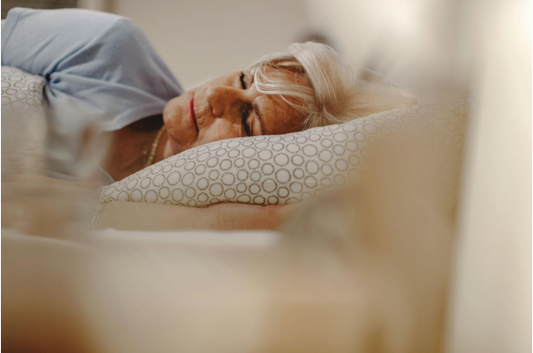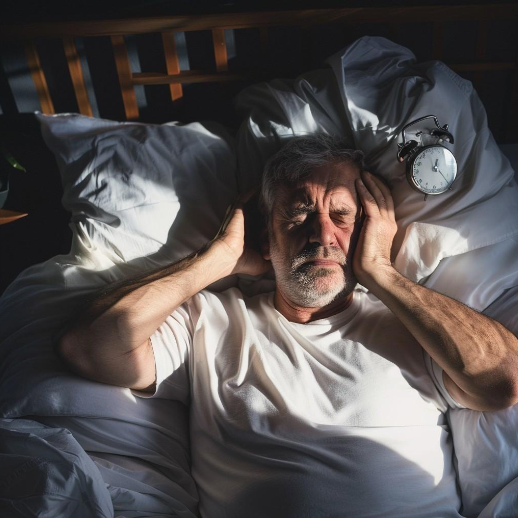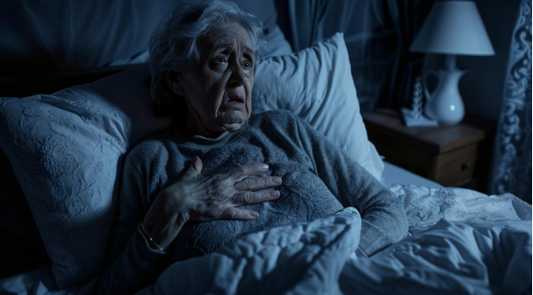Do you find it hard to sleep at night because your mind won't stop thinking about the day's events?
People who have difficulty falling asleep may try medications that make you sleepy. These solutions are not ideal, but they can be useful in the short-term — especially when you need better sleep quickly.
If you want long-term sleep, you need better long-term sleep tips and solutions.
Getting a few tips for better sleep from friends and relatives is great, but we may have a few you haven’t tried yet!
Natural methods of getting a better night of sleep include having a consistent bedtime routine, avoiding screens at least an hour before bed, reading before bed, doing gentle exercise during the day, and practicing certain mindfulness techniques.
However, different “sleep better” tips tend to work for different people, so take some time to experiment and find better sleep tips that work for you.
These 4 sleep better tips may seem strange at first, but could potentially be the way to get deep and restful sleep.
Unconventional Sleep Tip #1: Soak Up the Sun During the Day
The first of our unusual how to fall asleep tips is something most may not think of right away.
Early morning hours are when most people experience the difference between a restful sleep and lack of sleep.
Evening exposure to artificial light should be minimum, and the morning should include an abundance of sunlight throughout the day.
That might not seem to make any sense, but there's evidence that it's true, especially if you have a circadian rhythm disorder.
For most people, exposure to sunlight is most beneficial if it occurs in the morning just after waking, typically within the first hour after crawling out of bed. But, if you ever forget the best times to get sunlight for better sleep, follow these quick guidelines:
- Within an hour of waking
- 30-45 minutes
- No sunglasses, visors
- Direct light, not through glass
- Sunscreen use isn't a problem
Full sunlight is the best source of natural light for sleep improvement.
Exposure to light also can be helpful in people who suffer from difficulty sleeping as a result of insomnia by helping to regularize the patterns of sleep and wakefulness.
Not everyone feels sleepy around the same time each night. Although about 10% of people sleep most soundly from midnight to 6 am, the label of "night owl" doesn't fit everyone.
Light is the principal control of our sleep wake cycle, influencing everything from body temperature to metabolism to sleep.
Without it, our bodies will run on a pattern determined by our genetics, which can leave you restless, disoriented and unable to sleep.
Unconventional Sleep Tip #2: Turn on Soothing Music
Have you ever fallen asleep listening to your favorite song? Or maybe you've listened to soothing reiki music before bed?
For many people, music can help them fall asleep and it’s one of the newest and most popular ways to fall asleep faster.
The connection between sleep and music has been observed all over the world. Studies have shown that music helps with sleep for people of all ages.
How can you make the most out of your sleep with music? These music sleeping tips are a good place to start:
- Find enjoyable songs: If you don’t like the mix of songs on a pre-made playlist, try making your own. You may find that certain types of music work better for calming you down than others, so experiment and see what works best.
- Avoid songs that cause strong emotional reactions: We all have songs that bring up strong emotions. Listen to these while trying to sleep may not be the best idea because they can create a negative vibe, so try music that isn’t associated with any specific emotion like neutral or positive
- Be careful with headphones: Too much volume can cause hearing damage, as well as an increased risk of ear infections. The best solution is to set up a small stereo system or speaker close by and find music with a soothing volume that will help you fall asleep.
Music has long been thought of as a therapeutic tool. But does it really help improve your sleep?
Listening to music is a common sleep aid. Digital streaming service Apple Music provides playlists that are engineered to put listeners to bed at night.
From songs promising induced sleepiness to bedtime stories for adults, nighttime listening is not one size fits all.
Music may be the next best thing to counting sheep, so why not give it a try?
Unconventional Sleep Tip #3: Keep Yourself Awake at Night
Music is only one more of the unusual how to fall asleep tips listed here. But this next one could be considered confusing.
If you cannot fall asleep within 15 to 20 minutes, you should leave your bed and stay awake.
Confusing, right? Let us explain.
This is called stimulus control. Move to another place where you can recline and engage in relaxing activities while waiting for sleepiness to come.
These activities should not be too stimulating, but it can be activities such as:
Avoid computers and television and stretch or breathe slowly, allowing any tension to fade.
Once you feel drowsy — with your eyelids getting heavy — that's when you return to your bed.
Waiting until you are tired before going to sleep maximizes your sleep. It is important for the time awake when doing these activities during the night to remain short — 15 minutes at most — because you could disrupt your sleep cycle.
What if we stayed in bed while awake? We might subconsciously start to associate our beds with being awake and feel a sense of tension or anxiety.
Whenever you can't sleep, get up, get slightly active and hit the hay soon after.
Unconventional Sleep Tip #4: Do a Few Yoga Poses
Yoga is a gentle and soothing way to wind down your day for some restful and deep sleep later on in the evening.
A national survey found that over 55% of people who recently started yoga reported improved sleep.
Yoga has been found to not only have a positive effect on both sleep and stress levels, but yoga may also:
Choose a form of yoga that is slow and controlled, not physically strenuous. Slow movements prevent you from losing focus or overthinking the movement.
Here are a few yoga poses you can try at home, right before bed:
Supta Padangusthasana (Reclining Big Toe Pose): 1 minute with 10–15 breaths on each side.

Lie on your back with your big toes together. Inhale and bring your right leg vertical, clasping the back of your thigh. Push your thigh into your hands until you have a tight muscle-to-bone connection. Hold for 5 breaths and switch sides.
Parsva Upavistha Konasana (Side Seated Wide Angle Pose) 1 minute with 10–15 breaths on each side.

Sit with your legs spread wide. Place a block on the inside of your right shin. Press your fingertips into the floor. Inhale and lengthen your spine. Exhale, come forward, and twist your torso over your right leg, resting your forehead on the block. After 5 breaths, come up and switch sides.
Supta Baddha Konasana (Reclining Bound Angle Pose) 2 minutes with 20–30 breaths on each side.

Place a bolster at the base of your sacrum. Bend your knees and place the soles of your feet together. Lie back on your bolster and support your head with a blanket, so that your head is above your heart. Allow the knees to open and relax into the props.
To maximize the effectiveness of your sleep, try to do at least a few Yoga sessions each week. Aim for around 20 minutes of daily Yoga in the evening before bed.
Conventional
If these options are a bit too unconventional for you, we have a few tried and true options that work just as well. We have a variety of supplement products that can help with sleep relaxation or deeper sleep and if you're not exactly sure what you need, take our chronotype quiz that will help you discover your chronotype, your sleep issues and allow us to create a personalized sleep kit just for you.
A Good Night’s Sleep Is Possible
Sleep is one of the most important things you can do for your health.
We all know that we need enough sleep, but it’s not always easy to find time in our busy schedules for a good night's rest.
If you're looking for some new (and unusual) better sleep tips and tricks to improve your sleep quality, check out these Sleep Tricks or a few more tips here.




